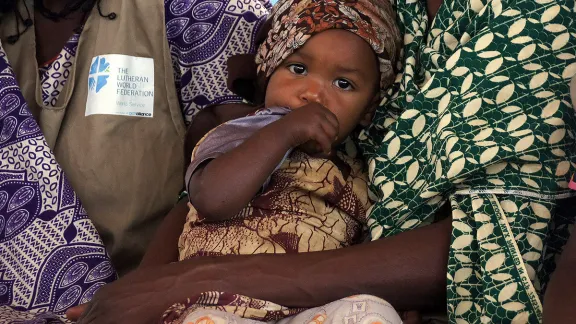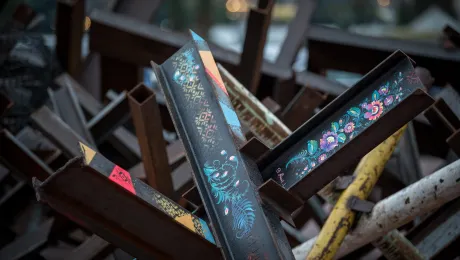
A child is cradled by her mother during one of the meetings of the peace committee in Borgop camp, Cameroon. The committee mediates conflicts involving the refugees, and has also managed to reduce domestic violence and violence against children. Photo: LWF/ C. Kästner
LWF peace committee mediates conflicts in refugee camp in Cameroon
“We thought about what had happened, what we had lost. We thought about family members who had been killed, and we got angry very easily,” says Bachirou Moussa, president of the refugees in Borgop refugee camp, and head of the peace committee. “We had seen fighting when we left, and when we came here, we thought all issues should be resolved by fighting.”
Borgop camp is situated in Cameroon, not far from the city of Meiganga, where The Lutheran World Federation (LWF) established its emergency operation and provides assistance to refugees who live and Borgop and the surrounding communities, ranging from education, livelihoods and community services to peace-building activities like the committee, which Moussa is a part of.
“We need to be careful”
Bachirou Moussa represents 12,000 men, women and children who have fled the conflict in the Central African Republic (CAR). Displaced by the radical Anti-Balaka militia, they found a new home in Cameroon. However conflict had followed them: The trauma of violence, loss and displacement was felt by many, people were anxious and the needs in the refugee camp made them easily irritated.
There were conflicts between farmers and pastoralists, with the host community but also among the refugees, whose animals would eat or destroy the plants of others. Women fought at the water distribution points. Even the children fought among themselves after school, the president recalls.
Before, when an animal destroyed a field, the farmer would just have killed that animal. Now, he takes that animal back to its owner and demands compensation.
“Peace is like salt, you only notice it when it is missing,” says André Pazie. He is the peace officer of the LWF field team in Meiganga. Pazie and his team have experience with situations like these and set up different mechanisms to dissolve the tension in the camp. One way was to form a peace committee and listening clubs, consisting of women and men who would serve as mediators and spread messages of peaceful co-habitation.
The messages of peace were transmitted by the members of the peace committee, who went from house to house and raised awareness about non-violent conflict solving. They were supported by the griots, traditional “Praise singers”, who filled their lively music with messages about how to live together. Local radio stations would also promote peaceful conflict resolution.
LWF also organized cultural events among the refugees and between refugees and hosts, traditional dance and football matches in mixed teams. “You need to be pre-emptive”, Pazie says. “These activities help to relieve the stress. There is always a potential for conflict. We need to be careful.”
Life in dignity
The peace committee itself is the main instrument for peacebuilding. It can be called upon by the conflict parties or neighbors who witness a fight, the president explains. “If someone’s goat destroys a vegetable field, we send a mixed group to look at the damage and talk to all parties involved. We then propose a compensation.” Usually, conflict parties follow that recommendation, also because the peace committee consists of traditional leaders with a lot of authority in the community.
“Before, when an animal destroyed a field, the farmer would just have killed that animal,” Moussa says. “Now, he takes that animal back to its owner and demands compensation.”
Change families and community
According to the peace committee, most of the conflicts are related to poverty: fetching water at a water point, idle young people getting drunk and breaking into houses. After the men have left the room, women open up about domestic violence. Conflict and displacement have also upset the families.
“Back home, before the war, life between men and women was better,” says Fatimatou Ousmanu. “Our husbands had money and could take care of the family. After we had lost everything, things became difficult in the families. Through the peace committees, men and women learned about forgiveness and about being patient.”
“Before I thought that in order to educate children, you need violence. You need to punish them. Now we know that there is another way,” Bonedji Adama, one of the elderly members of the peace committee, adds.
More than survival
LWF peace officer Pazie adds that LWF as well as the committees also work with judges and law enforcement if necessary - a complement to handle cases that go beyond the structure of a peace committee. In his opinion, peace-building work also needs to ensure that refugees can live in dignity, and look beyond merely surviving the next day.
Income-generating activities such as tailoring, poultry farming and agriculture are therefore part of the project. “The people escaped the war with little more than their life,” he says. “They think they have nothing left. We want to show them that they still have a choice on how to live the life they saved with dignity.”
As the civil war in CAR has evolved into a protracted conflict, peace-building work is also vital for the integration of the refugees into local communities. “When we came, we belonged to different tribes and families, and we had different opinions about many things,” says Hamaoboce Hamidou. “Here, we realized we are all in the same situation. We have discovered that peace is more important than anything.”
By Cornelia Kästner, Office for Communication Services


